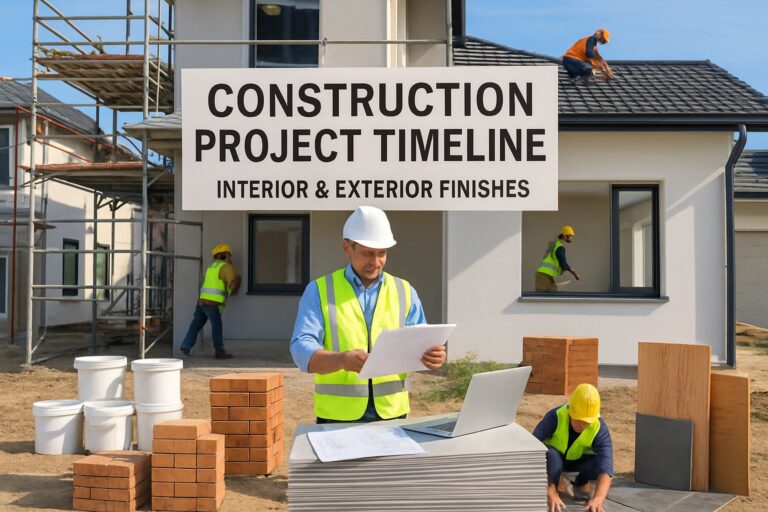Renovating your home or starting a construction project in Toronto requires careful planning, especially when it comes to your budget. Understanding what it costs to hire a general contractor in the city can help you make informed decisions and avoid financial surprises. The average cost of hiring a general contractor in Toronto typically ranges from 10% to 20% of the total project cost, with most contractors charging between $50 and $150 per hour depending on project complexity and the contractor’s experience level.

The construction industry in Toronto has seen steady growth over the past decade, creating a competitive marketplace for contractors. This competition can work in your favor as a homeowner, but it’s important to understand that the lowest bid isn’t always the best choice. Several factors influence contractor costs, including project scope, material quality, labor requirements, and Toronto’s specific building regulations which can impact both timelines and expenses.
When planning your renovation or construction project, remember that hiring a professional general contractor might seem expensive initially, but their expertise can ultimately save you money by avoiding costly mistakes and ensuring the work meets local building codes. Most Toronto contractors will provide a detailed quote that breaks down labor costs, materials, permits, and their management fee to give you a clear picture of where your money is going.
Key Takeaways
- General contractors in Toronto typically charge 10-20% of the total project cost or $50-150 hourly depending on expertise and project complexity.
- Hiring an experienced contractor may cost more upfront but can prevent expensive mistakes and ensure compliance with local building codes.
- Getting detailed quotes from multiple contractors that break down all costs will help you make an informed decision and better manage your renovation budget.
Understanding the Role of a General Contractor in Toronto
General contractors in Toronto serve as the central coordinators for construction and renovation projects, managing everything from initial planning to final completion. They act as the primary point of contact between homeowners and the various trades required to complete a project.
Services Provided by General Contractors
General contractors in Toronto typically offer a comprehensive range of services. They handle project management responsibilities including budget control, timeline development, and quality assurance.
These professionals secure necessary building permits and ensure all work meets Toronto’s building codes and regulations. They coordinate with city officials for inspections throughout the construction process.
General contractors hire and supervise specialized subcontractors such as electricians, plumbers, and carpenters. They source and purchase construction materials, often leveraging established supplier relationships for better pricing.
They also manage unexpected issues that arise during construction, providing problem-solving expertise when complications occur. Many general contractors offer design consultation services or work closely with architects to refine project plans.
Types of Projects Managed
Toronto general contractors handle a wide variety of project types. Residential renovations form a large portion of their work, including kitchen and bathroom remodels, basement finishing, and whole-home renovations.
New home construction projects are managed from foundation to finishing touches. Commercial renovations and builds for retail spaces, offices, and restaurants require specialized knowledge of commercial building codes.
Many Toronto contractors specialize in construction services for heritage properties, navigating preservation requirements while modernizing interiors. Addition projects extend existing structures to create more living space.
Other common projects include:
- Outdoor living spaces (decks, patios)
- Accessibility modifications
- Energy efficiency upgrades
- Post-disaster restoration
Project scale ranges from small weekend jobs to multi-year construction projects with seven-figure budgets.
Factors Influencing the Cost of Hiring a General Contractor

Several key elements determine how much you’ll pay when hiring a general contractor in Toronto. These factors can significantly impact your budget and should be carefully considered before starting any construction project.
Project Size and Complexity
The scope of your renovation or construction project directly affects contractor costs. Different methodologies and work habits are required based on project complexity.
Large-scale projects like whole home renovations typically cost more than smaller jobs such as bathroom updates. This is because they require more extensive planning, coordination, and supervision.
Custom homes and complex designs with unusual architectural features demand specialized knowledge and skills, leading to higher contractor fees. These projects often involve structural modifications that require additional permits and engineering assessments.
Projects with tight timelines may incur premium charges as contractors must coordinate multiple trades to work simultaneously or during off-hours.
Location and Market Demand
Toronto’s diverse neighborhoods significantly impact contractor pricing. Premium areas like Yorkville or Forest Hill often command higher rates than others.
Contractors may charge more in locations with difficult site access or limited parking, as these conditions increase logistical challenges and labor time.
Market demand plays a crucial role in pricing. During construction booms, contractors cannot offer regular employment to all workers, affecting availability and rates.
Seasonal factors also influence costs. Winter projects involving exterior work typically cost more due to heating requirements and weather-related delays.
Local building codes and permit requirements vary by neighborhood, potentially adding administrative costs to your project.
Materials and Finishes
The quality and type of materials chosen dramatically impact the final cost of construction projects. High-end finishes like imported marble or custom cabinetry will significantly increase overall expenses.
Material Cost Tiers:
- Economy: Basic materials, standard fixtures
- Mid-range: Improved quality, better durability
- Premium: High-end brands, custom items, specialty materials
Supply chain issues can affect material costs and project timelines. Contractors may charge more when materials are difficult to source or require special ordering.
Material wastage is another consideration. Complex designs typically generate more waste, and contractors factor this into their pricing calculations.
Labor costs associated with installation vary significantly based on the complexity of materials used. Some premium finishes require specialized installation techniques and experienced craftspeople.
Breakdown of Typical Costs and Pricing Structures

Understanding contractor costs in Toronto helps homeowners make informed decisions and avoid budget surprises. The pricing structure typically includes labor, materials, permits, and profit margins that vary by project type and scope.
Labor Costs and Tradespeople
Labor typically represents 30-50% of your total project cost when hiring a general contractor in Toronto. Different tradespeople command different rates based on their specialization and experience level.
Average Hourly Rates for Trades (Toronto, 2025):
- Electricians: $85-110 per hour
- Plumbers: $90-120 per hour
- Carpenters: $70-95 per hour
- Painters: $50-75 per hour
- Masons: $65-90 per hour
- Handymen: $45-70 per hour
Specialized tradespeople with certifications or union membership often charge premium rates. Most contractors include a markup of 10-20% on subcontractor labor to cover coordination and quality assurance.
Remember that labor costs fluctuate seasonally. Summer months typically see higher rates due to increased demand, while winter projects may offer some savings on non-emergency work.
Permits, Inspections, and Fees
Permits and inspections are non-negotiable costs that ensure your project meets building codes and safety standards. In Toronto, permit fees typically range from $200 for minor renovations to $2,000+ for major structural changes.
Common Toronto Permit Costs:
- Basic renovation permit: $198-$350
- Plumbing permit: $250-$500
- Electrical permit: $175-$400
- HVAC modifications: $225-$450
The contractor should handle permit applications, but verify who will pay these fees. Some contractors include permit costs in their quotes while others list them as separate items.
Inspections are typically scheduled at critical project milestones. Failed inspections can result in costly corrections and delays, so hiring a contractor familiar with Toronto’s building codes is essential.
Additional municipal fees may apply for projects affecting water lines, sewer connections, or street access. Always budget an extra 5-10% for unexpected permit-related expenses.
Payment Schedule and Budget Planning
A well-structured payment schedule protects both homeowners and contractors. Most Toronto contractors follow a milestone-based payment structure rather than requiring large upfront payments.
Typical Payment Structure:
- Initial deposit: 10-15% (upon signing contract)
- Milestone payments: 20-25% at predetermined stages
- Final payment: 10-15% upon completion and inspection
Always request detailed quotes from multiple contractors. These should itemize materials, labor, permits, and the contractor’s markup. Many reputable contractors offer free estimates for standard projects.
Budget overruns happen for various reasons including unforeseen structural issues or material price fluctuations. Establish a contingency fund of 15-20% above the quoted price to accommodate these potential changes.
Never pay the final installment until all work is completed to your satisfaction. This provides leverage to ensure any outstanding issues are addressed properly.
How to Choose the Right General Contractor in Toronto
Selecting a qualified contractor requires careful evaluation of their credentials, past work, and reputation. Toronto homeowners must conduct thorough research to find professionals who can deliver quality work within budget and timeline constraints.
Licensing, Insurance, and Legal Requirements
Every legitimate general contractor in Toronto must hold proper licensing through the City of Toronto. This includes registration with the Ontario College of Trades for specific skilled work. Always verify these credentials before signing any contracts.
Insurance coverage is non-negotiable. Reputable contractors should carry comprehensive liability insurance (minimum $2 million) and WSIB (Workplace Safety and Insurance Board) coverage. These protections safeguard you from potential lawsuits if accidents occur on your property.
Request documentation proof of both licensing and insurance. Legitimate contractors will readily provide these documents. This verification step protects you from potential legal complications and financial liabilities that could arise with uninsured or unlicensed contractors.
Contract terms should be clearly defined before work begins. This includes payment schedules, work timelines, and dispute resolution processes.
Evaluating Experience and Completed Projects
An experienced contractor brings valuable expertise to your project. Look for professionals with at least 5-7 years of relevant experience in Toronto’s construction market. Their familiarity with local building codes and permit requirements is essential.
Examine their portfolio of completed projects, particularly those similar to yours. Quality contractors will have photographs documenting their work from start to finish. This visual evidence helps assess their craftsmanship and attention to detail.
Consider their specialization areas. Some contractors excel at kitchen renovations while others specialize in whole-home remodels or commercial construction. Choose someone whose expertise aligns with your project requirements.
Request in-person visits to current job sites when possible. This provides insight into their work processes, site management, and safety protocols in action.
Seeking References and Client Testimonials
Always ask potential contractors for at least 3-5 recent client references. Contact these references to inquire about their experiences regarding:
- Communication quality
- Adherence to timelines and budgets
- Problem-solving abilities
- Overall satisfaction with the finished work
Online reviews offer additional perspectives. Check platforms like HomeStars, Google Reviews, and the Better Business Bureau for patterns in feedback. Consider how the contractor responds to negative reviews, as this indicates their customer service approach.
Many qualified contractors collaborate with architects and interior designers. These professionals can often provide recommendations based on previous successful partnerships.
Pay attention to how contractors communicate during the initial consultation. Their responsiveness, clarity, and willingness to answer questions typically reflect how they’ll behave throughout your project.
Tips for Managing Renovation Costs Effectively
Successful renovation projects in Toronto require careful financial planning and strategic decision-making. Proper management of your renovation budget can save thousands of dollars while still achieving your desired results.
Obtaining Multiple Quotes
Always gather at least three detailed quotes from different contractors before making a decision. Each quote should break down labor costs, material expenses, and potential additional charges. This breakdown helps identify where costs differ between contractors.
When comparing quotes, look beyond the bottom line. A significantly lower price might indicate corners being cut or lower quality materials. Consider asking each contractor about their supplier relationships and bulk discount opportunities.
For major projects like a kitchen renovation, request a detailed timeline alongside the quote. Delays often translate to increased costs, especially if you need temporary accommodation during the renovation.
Toronto contractors typically include a contingency of 10-15% for unexpected issues. This buffer is particularly important for older homes where hidden problems may emerge during the renovation process.
Communication and Dispute Resolution
Clear, consistent communication prevents costly misunderstandings. Establish a regular update schedule with your contractor to track progress and address concerns immediately. Many home renovation disputes arise from communication gaps.
Document all decisions, changes, and agreements in writing. Email confirmations work well for tracking conversations about materials, timelines, and design modifications. A good contractor will provide detailed written responses to questions.
When disputes arise, address them promptly and professionally. Reference your contract terms when discussing solutions. Most reputable Toronto contractors have established problem-solving protocols to handle disagreements efficiently.
Consider including a mediation clause in your contract as a cost-effective alternative to litigation if serious disagreements occur. This approach typically costs significantly less than court proceedings.
Avoiding Common Budget Pitfalls
Create a detailed scope of work before the project begins. Changing plans mid-renovation almost always increases costs. For example, moving plumbing fixtures after installation can double that portion of your budget.
Set aside a dedicated contingency fund of 15-20% for unexpected issues. Toronto homes, especially in older neighborhoods, often reveal hidden problems like outdated wiring or structural issues during renovations.
Avoid the temptation to purchase materials independently without consulting your contractor. While it might seem cost-effective, incompatible materials can lead to substantial up-front costs in labor to adapt them or replace them entirely.
Consider timing your renovation project during contractors’ off-peak seasons (typically late fall or winter) when rates might be more competitive. Many Toronto contractors offer discounts of 5-10% during slower periods.
Resources for Finding and Hiring General Contractors in Toronto
Finding the right general contractor in Toronto requires access to reliable resources and platforms. These tools can help homeowners connect with qualified professionals, verify credentials, and compare past projects to make informed decisions.
Online Platforms and Reviews
Several online platforms make the contractor search process easier in Toronto. Homeowners can post a job on sites like HomeAdvisor and Angi to connect with local professionals. These platforms often include verified reviews and ratings from previous clients.
Toronto-specific companies like Astaneh Construction and Mr. General Contractor maintain online profiles with detailed portfolios. Their websites typically showcase before-and-after photos of completed projects.
When reading online reviews, pay attention to:
- Response to problems (how contractors handled issues)
- Timeline adherence
- Budget management
- Communication quality
Most platforms have a customer helpdesk and reviews policy to ensure feedback remains authentic. Always check multiple sources as review quality can vary between platforms.
Professional Associations and Referrals
Professional associations provide access to contractors who meet specific industry standards. The Toronto Construction Association and Self Build Canada connect homeowners with verified professionals who adhere to ethical business practices.
Build It Toronto hosts regular events where homeowners can meet contractors in person. These face-to-face interactions provide valuable insights into a contractor’s communication style and professionalism.
Personal referrals remain one of the most trusted methods for finding quality contractors. Ask neighbors, friends, and family who have completed similar renovations for recommendations.
Many contractors in Toronto rely on word-of-mouth referrals and maintain strong relationships with past clients. They often offer references who can share their experiences directly with potential new clients.
Comparing Similar Projects and Providers
When evaluating potential contractors, requesting examples of similar projects is essential. This allows homeowners to assess the contractor’s experience with specific types of renovations or construction challenges.
Ask for:
- Photos of completed projects
- Detailed timelines
- Original budgets vs. final costs
- Challenges encountered and solutions implemented
Client testimonials provide valuable insights into the contractor’s work ethic, reliability, and problem-solving abilities. Most reputable contractors maintain a portfolio of references willing to discuss their experiences.
Toronto’s competitive contractor market means many firms specialize in specific project types. Look for contractors who regularly complete projects similar to yours in scope, style, and budget. This specialization often results in more efficient work and fewer unexpected issues.
Frequently Asked Questions
Toronto homeowners often have specific questions about contractor costs before starting renovation projects. Understanding typical rates, payment structures, and fee breakdowns helps create realistic budgets and avoid surprises.
What is the average hourly rate for a general contractor in Toronto?
General contractors in Toronto typically charge between $50-$150 per hour depending on experience and specialization. More experienced contractors with specialized skills may charge at the higher end of this range.
The Toronto construction market has sustained healthy growth over the past decade, which has influenced these rates. Market demand and project complexity also affect hourly pricing.
Smaller maintenance jobs often fall in the $50-85 range, while complex renovations requiring specialized knowledge command $100-150 hourly rates.
How much should I expect to pay a contractor up front when starting a project in Canada?
In Toronto, the standard deposit for contractors ranges from 10% to 30% of the total project cost. This upfront payment helps cover initial material purchases and secures your spot in the contractor’s schedule.
Provincial regulations may limit the maximum deposit amount to protect consumers. Never pay the full amount upfront regardless of the contractor’s request.
A common payment structure follows a schedule tied to project milestones, with payments distributed throughout the project timeline as specific phases are completed.
What percentage do general contractors typically add as a markup on materials?
General contractors in Toronto typically add 15-25% markup on materials. This markup covers their time sourcing materials, arranging deliveries, storage, and managing potential issues with supplies.
Higher-end contractors working on luxury projects may charge markups of 25-35% due to the specialized materials and additional coordination required.
Some contractors offer transparent “cost-plus” contracts where the markup percentage is clearly defined in the agreement before work begins.
Is it generally more costly to hire a general contractor as opposed to subcontracting individually?
Hiring a general contractor typically costs 10-20% more than managing subcontractors yourself. However, this additional cost provides significant value through project coordination, quality control, and timeline management.
When you hire a contractor, you’re paying for their expertise in managing the complexities of construction projects. They handle permits, inspections, and scheduling of various trades.
Self-management of subcontractors requires substantial time investment and construction knowledge. Mistakes in sequencing work can lead to costly delays and rework that often exceeds the general contractor’s fee.
What are reasonable general contractor fees for a residential project in Toronto?
For residential projects in Toronto, general contractors typically charge 15-25% of the total project cost as their management fee. A $100,000 renovation would include approximately $15,000-25,000 in contractor fees.
Smaller projects under $50,000 might see slightly higher percentage fees (20-30%) since the overhead costs represent a larger proportion of the overall budget.
Complex renovations involving multiple rooms or heritage properties may command fees at the higher end of the range due to increased coordination requirements and specialized knowledge.
Why do general contractor rates appear to be high?
Contractor rates reflect business overhead costs including insurance, licensing, ongoing education, and administrative expenses. These indirect costs are necessary to maintain a legitimate construction business.
Toronto’s strict building codes and permit requirements demand contractors stay current with regulations and best practices, requiring continuous professional development.
Many contractors face pressure to avoid bad hires and maintain quality teams, leading to higher labor costs that are passed through to clients. High-quality work requires skilled tradespeople who command competitive wages.







